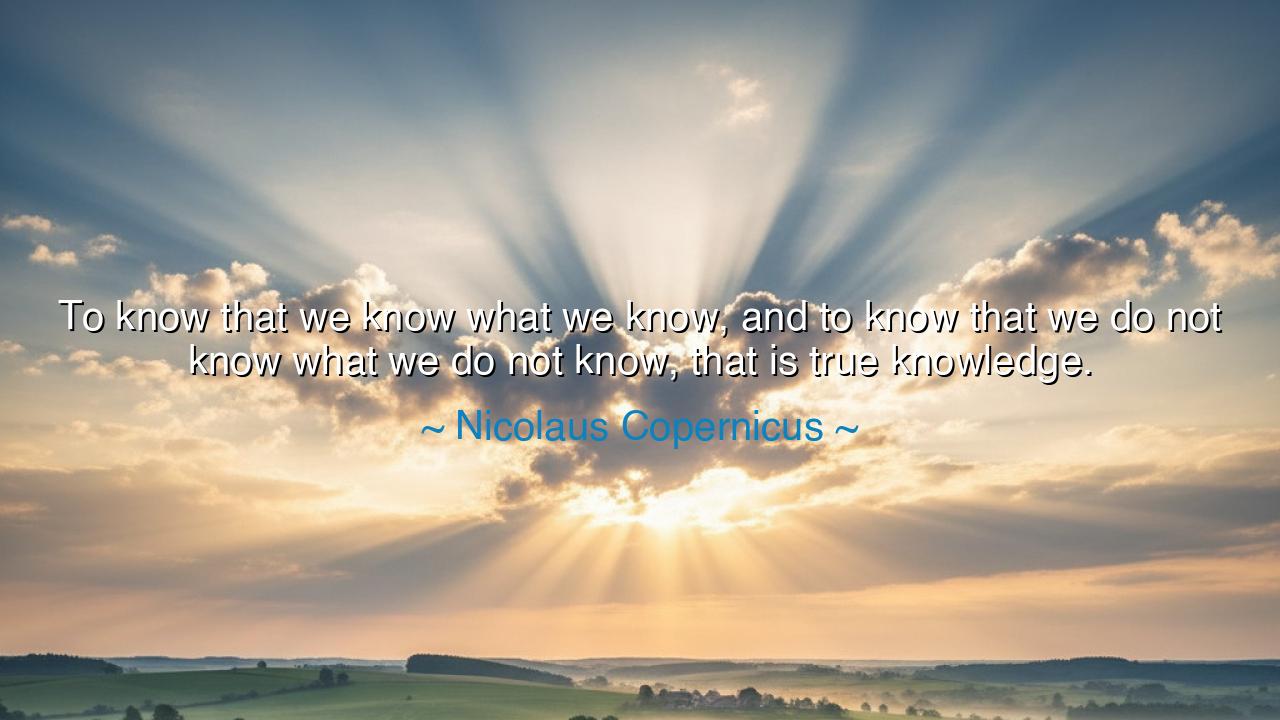
To know that we know what we know, and to know that we do not
To know that we know what we know, and to know that we do not know what we do not know, that is true knowledge.






Hear, O seekers of wisdom, the words of Nicolaus Copernicus, the great revealer of the heavens: “To know that we know what we know, and to know that we do not know what we do not know, that is true knowledge.” In this utterance lies a secret that few ever grasp — that wisdom is born not from the pride of knowing, but from the humility of awareness. For the greatest blindness is not ignorance itself, but the illusion of certainty. He who believes he knows all is already lost, but he who knows the limits of his understanding walks the path of enlightenment.
Copernicus spoke from the age when the firmament was thought unshakable, when men believed the Earth sat unmoving at the center of creation. Yet in his solitude, he gazed upon the stars and felt the whisper of truth stirring within him. He dared to see what others refused to see — that the Earth itself moved, that the heavens were not revolving around man, but that man was part of a far greater dance. This revelation was not only an act of discovery but an act of humility. For in realizing the vastness of the cosmos, Copernicus saw also the smallness of human knowledge. The universe, once imagined as a tidy kingdom ruled by man’s certainty, now expanded into infinity.
Thus, his words were not merely about the stars, but about the soul. To know that one knows — this is clarity, the confidence born of truth tested by reason. But to know that one does not know — this is wisdom, the humility that opens the door to endless learning. Both are essential. For without confidence, man will never act; without humility, he will never learn. True knowledge is not a fortress built to defend pride, but a bridge that stretches from the known to the unknown.
Consider, O listener, the tale of Socrates, the wise philosopher of Athens, who declared that he knew nothing — and in this, proved himself the wisest of men. For Socrates understood, as Copernicus did centuries later, that the recognition of ignorance is the beginning of wisdom. When questioned, he probed not to boast, but to uncover truth; when he found none certain, he rejoiced, for in the void of certainty lies the infinite field of discovery. His death was the seed of philosophy, his humility the light that guided generations.
This, then, is the lesson that Copernicus sought to bestow upon the ages: that knowledge is not a possession to be hoarded, but a journey without end. The mind that knows its bounds expands; the one that denies them collapses under its own arrogance. As the Earth turns unceasingly around the sun, so too must the soul revolve around the light of truth, ever learning, ever questioning, never still. To stop seeking is to stop living; to believe oneself complete is to begin decay.
Therefore, my children of thought, do not fear the unknown — revere it. Approach the mysteries of life not with the sword of pride, but with the lamp of wonder. Ask not only, “What do I know?” but also, “What do I not yet understand?” For in this question lies the heartbeat of all discovery. The wise man learns from the child, the scholar from the silence, the leader from the commoner. Only the arrogant wall themselves from revelation, mistaking the walls of their mind for the horizon of truth.
In your daily walk, practice this sacred art of self-awareness. When you are sure, test your certainty. When you are uncertain, seek with courage. Admit ignorance not as weakness, but as the first step toward illumination. Speak less to proclaim, more to learn. Listen not merely to respond, but to perceive. For the world reveals itself not to those who demand it to speak, but to those who are humble enough to hear its quiet lessons.
And so, remember the eternal wisdom of Copernicus: to truly know is to see both light and shadow, both what is clear and what is veiled. The mind that balances confidence with humility, certainty with curiosity, becomes as vast as the cosmos itself. Let your knowledge be like the orbit of the Earth — steady in truth, but ever turning toward greater light. For the heavens themselves declare it: the universe belongs not to those who claim to know it, but to those who keep learning its mysteries with open eyes and reverent hearts.






AAdministratorAdministrator
Welcome, honored guests. Please leave a comment, we will respond soon